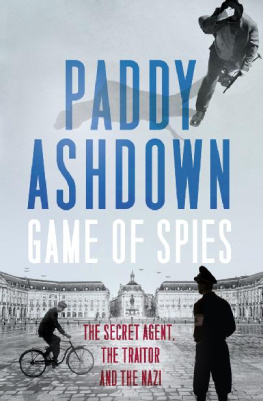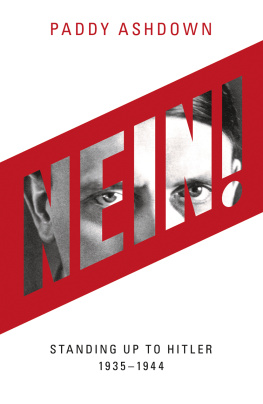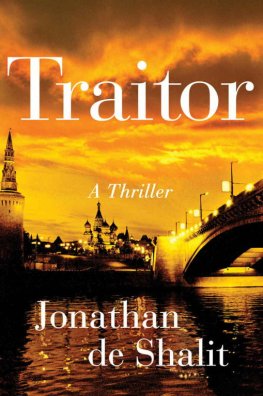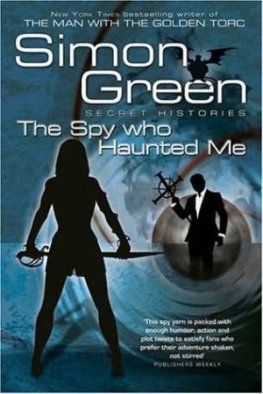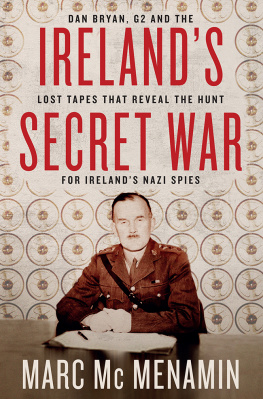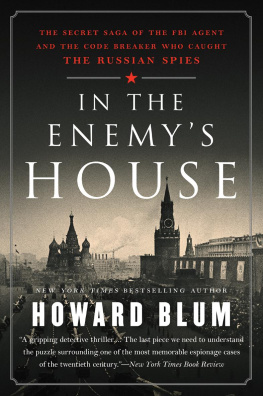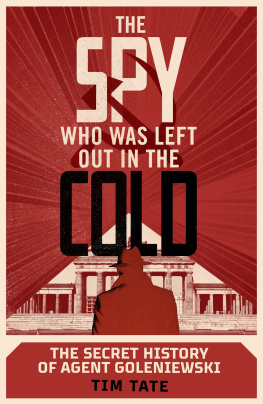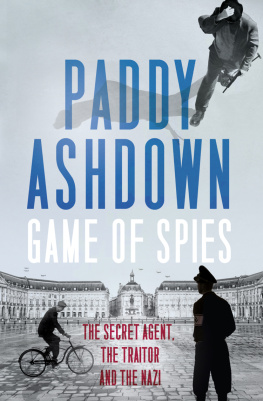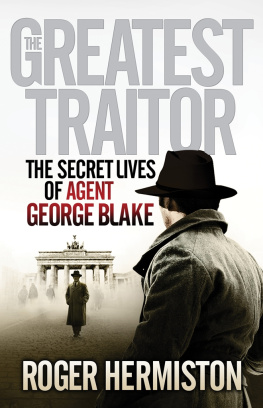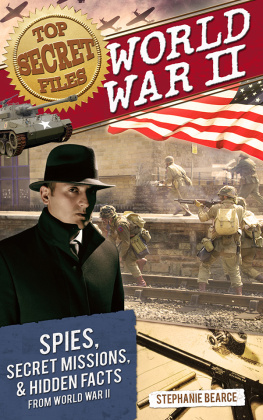Paddy Ashdown - Game of Spies: The Secret Agent, the Traitor and the Nazi
Here you can read online Paddy Ashdown - Game of Spies: The Secret Agent, the Traitor and the Nazi full text of the book (entire story) in english for free. Download pdf and epub, get meaning, cover and reviews about this ebook. year: 2016, publisher: HarperCollins UK, genre: Non-fiction. Description of the work, (preface) as well as reviews are available. Best literature library LitArk.com created for fans of good reading and offers a wide selection of genres:
Romance novel
Science fiction
Adventure
Detective
Science
History
Home and family
Prose
Art
Politics
Computer
Non-fiction
Religion
Business
Children
Humor
Choose a favorite category and find really read worthwhile books. Enjoy immersion in the world of imagination, feel the emotions of the characters or learn something new for yourself, make an fascinating discovery.
- Book:Game of Spies: The Secret Agent, the Traitor and the Nazi
- Author:
- Publisher:HarperCollins UK
- Genre:
- Year:2016
- Rating:4 / 5
- Favourites:Add to favourites
- Your mark:
- 80
- 1
- 2
- 3
- 4
- 5
Game of Spies: The Secret Agent, the Traitor and the Nazi: summary, description and annotation
We offer to read an annotation, description, summary or preface (depends on what the author of the book "Game of Spies: The Secret Agent, the Traitor and the Nazi" wrote himself). If you haven't found the necessary information about the book — write in the comments, we will try to find it.
Game of Spies: The Secret Agent, the Traitor and the Nazi — read online for free the complete book (whole text) full work
Below is the text of the book, divided by pages. System saving the place of the last page read, allows you to conveniently read the book "Game of Spies: The Secret Agent, the Traitor and the Nazi" online for free, without having to search again every time where you left off. Put a bookmark, and you can go to the page where you finished reading at any time.
Font size:
Interval:
Bookmark:

William Collins
An imprint of HarperCollins Publishers
1 London Bridge Street
London SE1 9GF
www.WilliamCollinsBooks.com
First published in Great Britain by William Collins 2016
Text Paddy and Jane Ashdown Partnership 2016
Extract from As I Walked Out One Evening the Estate of W. H. Auden,
reproduced by permission of Curtis Brown Ltd
While every effort has been made to trace the owners of copyright material reproduced herein, the author and publishers would like to apologise for any omissions and will be pleased to incorporate missing acknowledgements in any future editions.
Maps by John Gilkes
Cover photographs Susan Fox/Trevillion Images (spy); Imagno/Getty Images (cyclist); Shutterstock.com (all other images)
A catalogue record for this book is available from the British Library
All rights reserved under International and Pan-American Copyright Conventions. By payment of the required fees, you have been granted the non-exclusive, non-transferable right to access and read the text of this e-book on screen. No part of this text may be reproduced, transmitted, down-loaded, decompiled, reverse engineered, or stored in or introduced into any information storage and retrieval system, in any form or by any means, whether electronic or mechanical, now known or hereinafter invented, without the express written permission of HarperCollins.
Source ISBN: 9780008140823
Ebook Edition September 2016 ISBN: 9780008140830
Version: 2016-09-01
To the young men and women whose lives were changed in Room 055 of the Old War Office Building in London and ended in the death camps of Nazi Europe.
CONTENTS
O look, look in the mirror,
O look in your distress:
Life remains a blessing
Although you cannot bless.
O stand, stand at the window
As the tears scald and start;
You shall love your crooked neighbour
With your crooked heart.
It was late, late in the evening,
The lovers they were gone;
The clocks had ceased their chiming,
And the deep river ran on.
From As I Walked Out One Evening
W. H. Auden
The three main characters of this book Roger Landes, Andr Grandclment and Friedrich Dohse appeared as fleeting shadows in my book A Brilliant Little Operation , the story of the Cockleshell Heroes raid on Bordeaux in 1942. And thats the way they would have remained had it not been for a chance email from a friend. Richard Wooldridge, who I had got to know while researching my Cockleshell heroes book, runs the remarkable little Combined Services Military Museum at East Maldon in Essex, of which I am a sometime patron. He had been gifted some documents which had come to light after the death of the owner of a house called Aristide in Liphook, Hampshire. The papers had first been passed to a retired gentleman in the Isle of Wight, who asked Richard if his museum could provide a home for them.
Recognising the name Aristide from the work we had done together, Richard contacted me and asked if I would be interested. I was, but, due to pressure of work could not visit the museum myself to look at the archive. So my colleague and collaborator in this book, Sylvie Young, made the journey to East Maldon and brought back around 400 photographs of letters and papers from the museum. It soon became clear that what we had was the personal archive of one of the Second World Wars most remarkable secret agents Roger Landes.
And that is how this book began.
Since tracing Titos progress across the mountains of Bosnia (mostly on foot) and reading the remarkable accounts of F. W. D. Deakin and Fitzroy Maclean, who marched with Titos partisans, I have always been fascinated by that part of the Second World War in which Britain supported, fostered, and sometimes even created, bands of freedom fighters (the Germans called them terrorists) dedicated to the liberation of occupied Europe.
Looking back today, it seems to me extraordinary that our besieged little country commited so many of its young men and women and so much of its resources to secret and extremely hazardous operations to free the countries of Europe, which we have now chosen to be no part of. It seems extraordinary that a nation which today does less than any other member of the European Union to help those fleeing the misery of war, was, so short a time ago, their only refuge. After the shock of the Referendum result, I still cannot bring myself to believe that our country, which has now turned its back on solidarity with our European neighbours, was then so much their last hope that, from the alpine pastures of Norway to the mountaintops of Greece, those desperate for freedom from every nation in Europe gathered on moonlit nights to listen for the tiny reverberation in the air which would tell them that the dark shadow of an RAF Halifax from London would shortly pass over them, with its largesse of weapons and its message that they were not alone.
Of course, I know that that is the romance of the story. I know that there is more to it than that. There are legends, and myths, and very black deeds as well as brilliantly shining ones; and cowardice along with courage, and stupidity too, and vanity a lot of vanity and, it must be said, a good deal of betrayal as well. How could it be otherwise, since the basic ingredient of these stories is how ordinary, untrained, unsifted, unselected and unprepared individuals faced the great questions of life and death, which most of us have never had to face in our carefully pasteurised, cotton-wool worlds?
Fortunately, there is now a new mood amongst historians of the Resistance and especially the French Resistance. A much more granular picture is emerging. The role of women is, at last, coming to light. The failures and betrayals are being analysed, as well as the triumphs, and a much more objective view about the overall achievements and lack of them is beginning to appear. This is especially so in France, where the fashion for debunking the Resistance may now even be distorting the picture in the opposite direction.
The role of organisations such as the Gestapo in the story of the European resistance movements remains, on the other hand, a monochrome black. Little has been written in popular form about how the Gestapo worked, how it fitted into the German hierarchy and especially about the individuals involved. In the popular imagination, Klaus Barbie the Butcher of Lyon is the model for a Gestapo officer, and it is assumed they were all more or less like that. But of course they werent. It is time for a much more rounded description of what life was like then, not just for the secret agent operating in enemy territory, but also for the German security apparatus dealing with this so-called terrorist threat, bearing in mind that in our age too we are faced with challenges which are, in practical terms even if not in moral ones, not totally dissimilar.
Following up on the leads in the Aristide archives, we stumbled across the fact that Friedrich Dohse, a Gestapo counter-espionage officer in Bordeaux, had written his memoirs (the only such ones in existence, I believe). These covered the period when his overriding priority was to catch British SOE agent Roger Landes. The opportunity now presented itself to write something which gave both sides of the story.
The third person in the triumvirate at the heart of this book is Andr Grandclment. He was responsible for one of the most controversial betrayals in wartime France. Much has been written on him, but little about his psychology and the deeper reasons for his betrayal (if that, indeed, is what it was).
In this book I hope to give a picture of those times seen through the eyes of these three men three enemies who all lived and operated in wartime southwest France. In these pages, I trace their lives, almost on a day-to-day basis, over the two and a half years from the early months of 1942 to the final liberation of Bordeaux in August 1944.
Next pageFont size:
Interval:
Bookmark:
Similar books «Game of Spies: The Secret Agent, the Traitor and the Nazi»
Look at similar books to Game of Spies: The Secret Agent, the Traitor and the Nazi. We have selected literature similar in name and meaning in the hope of providing readers with more options to find new, interesting, not yet read works.
Discussion, reviews of the book Game of Spies: The Secret Agent, the Traitor and the Nazi and just readers' own opinions. Leave your comments, write what you think about the work, its meaning or the main characters. Specify what exactly you liked and what you didn't like, and why you think so.

